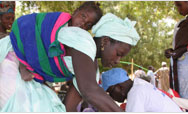USAID/OTI BOLIVIA SUCCESS STORY
May 2007
Helping the Drafters of Bolivia's New Magna Carta Make Informed Decisions
 |
| A Constituent Assembly delegate representing a rural indigenous community located in the Department of La Paz navigates the USAID-supported information center's virtual library for documentation on branches of government. |
In March 2004, USAID's Office of Transition Initiatives (OTI) launched its Bolivia program to help reduce tensions in areas prone to social conflict and to assist the country in preparing for key electoral events. OTI's activities sought to improve access to balanced information on issues of national importance; promote peaceful participation and economic opportunity in marginalized areas; and conduct civic education and leadership training in support of Bolivia's emerging indigenous leadership.
For the first time, the general elections in December 2005 included the popular election of prefects (i.e., governors), making decentralization one of the key transition issues now facing Bolivia. As result, OTI retargeted its program, and OTI activities now are aimed at building the capacity of prefect-led departmental governments to help them better respond to the constituencies they govern. OTI continues to work closely with indigenous groups to increase access to, and participation in, Bolivia's political system.
Known by its Spanish acronym CIEDAC, the USAID/OTI-supported Constituent Assembly Technical Information Center is helping delegates to the Constituent Assembly (CA) make informed, technically grounded decisions about Bolivia's future.
OTI has provided grants totaling $200,000 to implementing partner University San Francisco Xavier (USFX) to establish the center, which continues to be the only donor-funded initiative officially sanctioned to meet the assembly's technical information needs. The center is informing Bolivia's ongoing constitutional debate by providing delegates and their assistants with access to an extensive, systemized library of legislative and technical information in core areas of deliberations, including government systems, local government autonomy, administration of land and natural resources, and economic systems, as well as information on citizen rights and responsibilities.
To date, the CIEDAC project has established a print and digital library of more than 700 texts on Bolivian and international constitutional processes; held 35 technical information workshops and seminars during April and May, benefiting more than 200 delegates; received 1,300 visits (11 per day) from CA delegates and advisors since January; had more than 6,000 visitors to the center's Web site (www.ciedac.org.bo) since November 2006; and awarded certificates to 140 CA delegates and advisors for completing a course on the use of computers and the Internet.
Assembly delegates continue to express their appreciation for the wealth of technical information the center provides. In a recent letter of appreciation, Orlando Ceballos, President of the Other Institutes of State Commission, wrote, "With its efficient team and their decided resolve to ensure the success of the workshops and seminars, the information center has provided invaluable support that will allow us to confront with full confidence the work of rewriting the Bolivian Constitution."
USAID is coordinating closely with aid organizations from Denmark, Germany, the Netherlands, and Spain to provide additional rooms, computers, a library, and information covering key themes being treated during CA deliberations. Once the CA process is complete, USFX plans to convert CIEDAC into a post-graduate research center for constitutional studies.
For further information, please contact:
In Washington, D.C: Russell Porter, Regional Team Leader, 202-712-5455, rporter@usaid.gov
|


